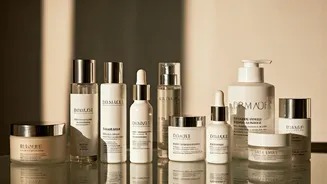Understanding Skin Changes
As the body progresses through its fourth decade, noticeable transformations occur within the skin's structure. The production of collagen and elastin,
responsible for skin's firmness and elasticity, begins to slow down. This biological shift results in decreased skin plumpness, leading to the appearance of fine lines, wrinkles, and a loss of overall radiance. Additionally, the skin's natural ability to retain moisture diminishes, which causes increased dryness and sensitivity. Environmental factors, like sun exposure and pollution, and lifestyle elements, like diet and stress levels, can further accelerate these age-related changes. Recognizing these shifts is the first step towards establishing an effective skincare regimen tailored to meet the specific requirements of mature skin.
Essential Cleansing Ritual
Cleansing is a cornerstone of any effective skincare routine, particularly in your 40s. Opt for a gentle, hydrating cleanser, avoiding harsh soaps that can strip the skin of its natural oils. Ingredients like hyaluronic acid, glycerin, and ceramides are highly beneficial as they help to moisturize and fortify the skin's barrier. The cleansing routine should be performed twice daily – once in the morning to eliminate any overnight buildup and a second time in the evening to eliminate makeup, pollutants, and the day's debris. Gently massage the cleanser onto the face using circular motions, then rinse thoroughly with lukewarm water. Pat the skin dry with a soft towel to prevent irritation, creating the perfect base for the next steps in your routine.
Targeting Active Ingredients
Incorporating active ingredients is vital for addressing specific skincare concerns that arise in your 40s. Retinoids, derived from Vitamin A, are renowned for their ability to boost collagen production, diminish wrinkles, and enhance skin texture. Start with a low concentration and slowly increase frequency to avoid irritation. Vitamin C, an antioxidant, helps shield the skin from free radicals, brightens complexion, and diminishes dark spots. Alpha-hydroxy acids (AHAs) and beta-hydroxy acids (BHAs) can be added to exfoliate the skin, refine pores, and boost cell turnover. Always introduce new actives gradually and consult with a dermatologist to determine the most suitable ingredients and formulations based on individual skin type and requirements.
The Hydration Powerhouse
Hydration is paramount for maintaining youthful and healthy skin in your 40s. Look for moisturizers that contain humectants like hyaluronic acid to draw moisture into the skin, and emollients such as ceramides and fatty acids to fortify the skin's barrier and prevent water loss. Applying moisturizer twice daily, after cleansing and before sunscreen, is crucial. In addition, consider incorporating hydrating serums into your routine, such as those that include peptides to promote collagen production. Using a humidifier, especially during dry seasons or in air-conditioned environments, can further assist in maintaining optimal skin hydration levels. Remember, well-hydrated skin appears plumper, smoother, and more radiant.
Sun Protection is Key
Sun protection is non-negotiable at any age, but it gains greater significance in your 40s. Daily exposure to the sun's ultraviolet (UV) rays is a leading cause of premature aging, including wrinkles, dark spots, and loss of elasticity. Apply a broad-spectrum sunscreen with an SPF of 30 or higher every day, even on cloudy days. Reapply sunscreen every two hours, especially if you spend time outdoors or are actively sweating. Incorporate sun-protective clothing, such as hats and sunglasses, into your daily routine. Consistent and meticulous sun protection is one of the most effective strategies for preserving skin health and minimizing the signs of aging.
Lifestyle Adjustments Matter
Beyond topical treatments, incorporating healthy lifestyle practices can significantly influence the condition of your skin. Consume a balanced diet rich in antioxidants, vitamins, and minerals. Foods like fruits, vegetables, and lean proteins provide essential nutrients that support skin health from within. Stay adequately hydrated by drinking plenty of water daily, which helps maintain skin's suppleness and facilitates cellular processes. Prioritize quality sleep as it allows the body to repair and rejuvenate, promoting a healthy skin barrier. Managing stress levels through techniques like yoga or meditation can reduce inflammation and minimize its negative impacts on the skin. Regular exercise can boost circulation, leading to improved skin tone and radiance.















